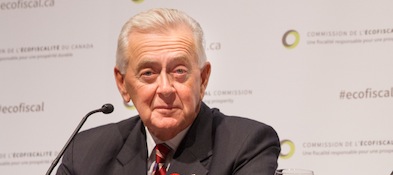
Preston Manning: A project for all Canadians
When I first started talking to people about the launch of Canada’s Ecofiscal Commission, someone asked me a tough question: Who is the villain in this story? It took me off-guard at first. But then I realized, the answer isn’t a “who,” it’s a “what.” And that “what” is a mindset. It’s a belief that economic prosperity can only be gained at the cost of environmental health. Or, inversely, that making progress on environmental goals means sacrificing economic ones. I don’t know a single Canadian who likes pollution and environmental degradation. Nor have I met anyone who is opposed to innovation, investment and better jobs. But I have met people, of all stripes, who are convinced that we are trapped in a zero-sum game of environment vs. economy. This, more than anything, is the hurdle we need to overcome to start moving the conversation beyond the problems to the solutions.
The good news is, there are strong and powerful voices helping push that discussion forward. Perhaps this will surprise you (and perhaps it won’t), but one of the most inspiring voices belongs to Preston Manning.
We talked to Mr. Manning about what he sees as both the opportunities and challenges for the Commission in turning around this mindset, in engaging Canadians in a dialogue not about “if we can do this” but about “how we do this.”
As Mr. Manning rightly points out, what we need is a conversation on the details. And those details need to be grounded in the realities of everyday Canadians in regions and cities across this country.
Over the next five years, as we delve into issues from carbon to congestion, water to waste, these are the conversations we aim to have. As economists, we hold the conviction that our economic prosperity is underpinned by our environmental health. We’re ready to roll up our sleeves and do the research needed to put practical options on the table for Canadians and our policy-makers. Because, at the end of the day, reconciling our economic and environmental goals isn’t about villains or heroes. It’s about doing what makes sense.




4 comments
I have had an idea for the past five years that if governments could legislate that any new houses that come onto the market will need to be built “off the grid” (the size of certain houses will just have to be reduced if this cannot be attained). They will need to have their own power sources, and heating systems. It is already possible and feasible. We just have to do it. Geothermal heating. Solar panels (dropping in price every day). Even small scale nuclear power. Wind power. Composting toilets. Re use of water. As more of these systems come “on line” so to speak a critical mass will be reached eventually in forty or fifty years, reducing or eliminating our reliance on fossil fuels and non-renewables. I can foresee a future society that will eliminate the need for an extensive networks of hydro lines and the bloated bureaucracy around it (with sooo many 100,000 dollar salaries as in the case of Ontario Power Generation…how did this happen???)
My thoughts anyway!
Good luck and God speed!
It’s all about the dialogue.
[…] Ecofiscal: A Project for All Canadians […]
Thrilled to learn about this group and it could not be more timely. Our organization (the Construction Resource Initiatives Council) run into the same kind of question Mr Manning noted all the time when speaking of waste and resource efficiencies – ‘Who’s fault is it’. And I agree, the mindset is a big issue. But I would dare add that our operating cultures (structures, systems, technologies and kills or abilities) also need to be considered.
This is why we are starting a new ‘Integration Initiative’ which I hope Canada’s Ecofiscal Commission will take part in, as our objectives clearly align. The first major project will be the creation of an International Resource Management Protocol and the inaugural meetings on this are expected to be in the greater Toronto area – likely the week of May 11th 2015. The idea is to start the ‘conversation on the details, grounded in the realities’ – to use Mr Manning’s words. The only difference is that because the building industry relies heavily on international trade, our conversations are focused on Canada and US, but include other regions. Which makes the ecofiscal discussion quite interesting as it brings a corporate social responsibility perspective we can hardly imagine when engaging internally.
I look forward to seeing where your commission goes with all of this and intend to will consider attending your January event.
Best wishes
Renée Gratton, LEED AP, President
Construction Resource Initiatives Council
Comments are closed.